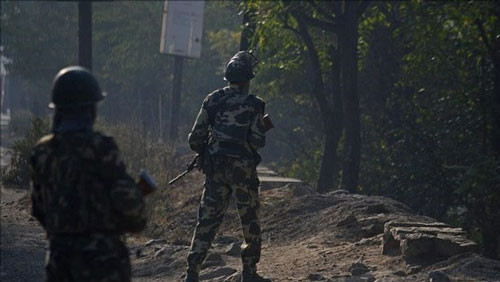In one of the longest and devastating demolition of houses carried out by the Indian occupation forces in recent times, large number of Kashmiri families hav been rendered homeless in the Indian Illegally Occupied Jammu and Kashmir (IIOJK).
The cordon and search operation (CASO) in the Rawalpora village of IIOJK’s Shopian district resulted in the killing of two Kashmiri youth.
One of the six houses razed down belonged to the slain local Sajjad Afghani’s family. The operation continued for over 70 hours.
Smoke continued to emanate from the site for days, locals said, as hundreds of people kept visiting the village, surrounded by lush green apple orchards, after the operation, Anadolu Agency reported.
According to a report posted on Agency’s website, the Geneva Convention of 1949, to which India was a signatory, discouraged the use of disproportionate force in armed conflicts.
“Experts believe the use of disproportionate force in the Kashmir region during CASOs is costing too much to the local population,” it added.
Sheikh Showkat Hussain, a political analyst in the region, said under the international law, use a disproportionate force in any armed conflict was forbidden.
As per data accessed by the Anadolu Agency, at least 114 residential houses were destroyed by the Indian troops in such operations last year.
According to the International Committee of the Red Cross, it was not only collective criminal punishment but harassment against a particular group.
“We possess nothing now. Our shelters were razed to the ground within a blink of an eye for which we took years to build. We were robbed emotionally, physically and mentally.
Even our source of income was lost too,” said one of the affected family members, wishing not to be named.
The locals feared further reprisal from the authorities. Some of them had to remain in custody for a fortnight in connection with the same encounter.
Bashir Ahmad (name changed) said that post-encounter they were living in a single room of an old house of a neighbour, and so was another family.
Not a single household item was retrieved during the fake encounter, said a female member of one of the families.
They said the education of their children had also been badly affected due to the displacement.
“It is very hard to live in a single room where all of us have to sleep, dine and cook,” another member of an affected family said, adding that the new accommodation they were putting up in did not have a washroom, forcing them to attend nature’s call in the open.
These homeless families said they had no means to build new houses due to the lack of resources.
“We could have rebuilt our houses, but our bank accounts were frozen by the authorities after being shared by people on social media,” another family member said.
Homeless widow No one can tell whether these families will be able to construct their new houses or not, but Noori Banoo’s family has not been able to do so.
Her family, consisting of four members, lost its house on July 3, 2017, when six houses were demolished in an encounter in which three youth were killed at Banoo village of Pulwama district.
Banoo’s family members said that five of the families received compensation from the government to rebuild their houses but their family was denied the same for unknown reasons.
Banoo lost her lone son in 1999 in one such fake encounter in Srinagar, said her adopted son, Mukhtar Ahmad Wani, adding that might be the likeliest reason for denying them compensation.
“The encounter took place in another house but ours was razed down to make way to pull down the house and at the end,” Wani said.
Banoo and her family are now living in south Kashmir’s Pulwama town since 2017 in a rented space, where they are being charged Rs 5,000 ($68) per month.
“We somehow manage the rent and food. It is not possible to build a new house at our native place from this income,” said Wani, who runs a small grocery shop.
Banoo says her razed house was worth a million built by her businessman husband who died in the 1990s.
“I had cherished so many dreams there and I wish that I die at the same place,” Banoo said.—Anadolu Agency










